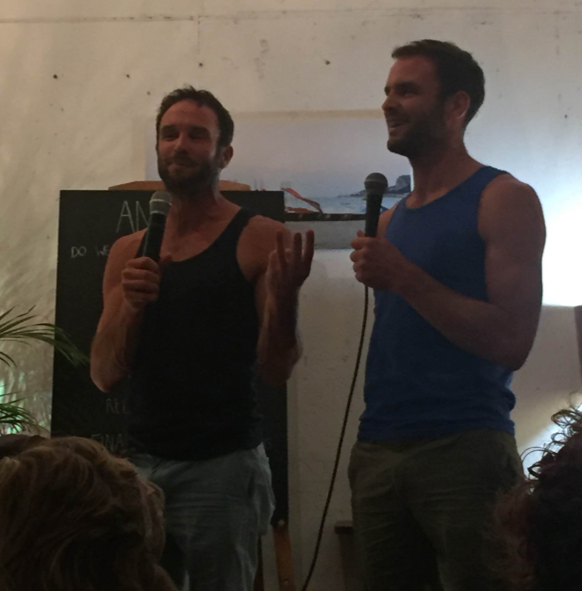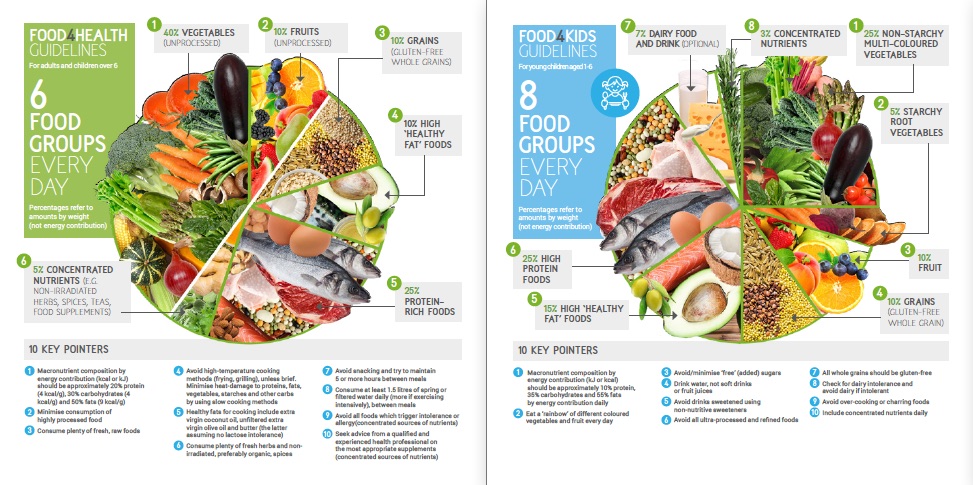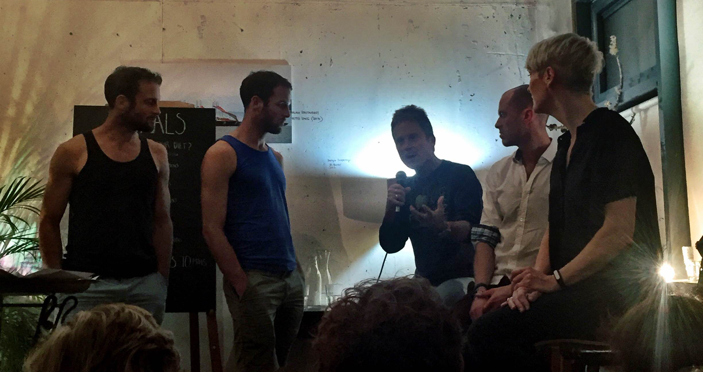Content Sections
Last Thursday at the Fumbally Stables’ Food & Health Debate in Dublin, Ireland, ANH’s Rob Verkerk PhD joined Finn Murray, from the Hopsack health store, Ireland’s longest standing health store, to argue the benefits of including meat in the human diet. Carrying the vegan flag, on the other side of the debate, were Dave and Steve Flynn, the dynamic identical twins behind one of the great Irish success stories for healthy local vegan and vegetarian lifestyles. Among their rapidly expanding business is a natural food store, two wholefood cafes and a restaurant.

Ably hosted by award-winning journalist Catherine Cleary, each side was initially given 10 minutes to state their respective cases. Time was then given over to a packed audience to ask questions before each side handled rebuttals of each others’ arguments. The fact that the straw poll taken by Catherine Cleary showed a win for Rob and Finn’s arguments for inclusion of some (and specific forms of) meat in the diet, detracts from the huge areas of common ground between all 4 debaters.

Finn Murray from The Hopsack in Rathmines, Dublin – also an organic beef and horticulture farmer
Evolution and science
We shouldn’t confuse whether or not we think humans evolved as omnivores, with sustainability, ecological and health aspects of meat eating. These were issues gently teased apart by Rob and Finn. They argued convincingly that human brain, teeth and gut evolution are related to our species’ long-standing tendency towards omnivory. Rob explained also that there we benefit from the amino acid, essential fatty acid, vitamin and mineral profile in healthy meats and fish, both of which are difficult to compensate for in plant-only diets.

Rob Verkerk PhD of ANH-Intl, leading the scientific and sustainability arguments for inclusion of certain types of meat and fish in the human diet
Plant-based eating
Dave and Steve Flynn, supported at times with some colourful language made their case for eating only plant foods, citing the work of Dean Ornish among others. Ornish has long argued, mistakenly we (and many others) believe, that high intakes of saturated fats and red meats are largely to blame for the US obesity epidemic.

David and Stephen Flynn, from The Happy Pear
The Flynn brothers made a passionate plea for just getting in more veg, touting the nutrient density, high fibre content and antioxidant properties among the quintessential benefits accessible to those consuming plant-based diets.
Downsides of meat-eating in today’s world
Rob and Finn shared the Flynn brothers’ views about the importance of a plant-based diet. The difference is that they proposed some meat and/or fish consumption to compensate for the limited amino acid (e.g. lysine, tryptophan), essential fatty acid (DHA, EPA), vitamin (e.g. B12) and mineral (e.g. zinc) profile of plant-only diets.
The pro-meat debaters also challenged factory farming, animal welfare standards, the effects of stress on meat quality, grain-feeding of cattle and its effect on diminishing the quality of the essential fatty acid profile. Rob went on to critique the damaging effects of over-cooking through the formation of glycation end products and carcinogenic amines in blackened or barbequed meats. He also warned of the carcinogenic risks of preserved meats.
The solutions, argued Finn and Rob, were linked to very careful sourcing of meats and fish, careful cooking methods that don’t involve use of unhealthy fats or excess heat – all of which can be most easily achieved by stepping away from the factory food system. Supermarkets represent the interface of this system with the consumer – and buying from local suppliers, be these the farm gate, farmers’ markets, box schemes for organic foods, or local health stores, green grocers, fishmongers or butchers.
Rob explained that the food composition approach he felt most suited humans today is embodied in the ANH’s Food4Heath guidelines for both adults and children.

ANH Food4Health and Food4Kids guidelines
Common ground

The audience were clearly surprised to find the extent of the availability of salad vegetables that had never come into contact with soil. This includes many varieties of baby leaf, tomatoes, lettuce, peppers (capsicum) and cucumber, among others. Without a living soil matrix around the root, plants are unable to assimilate the full nutrient content they require, all of which can be present in a rich, organic, living soil. The lack of flavour in many hydroponically grown veg is a direct effect of the limitations of the hydroponic growing medium. A rich, living soil is as much an an essential requirement for plants as is a healthy gut microbiome for our own health. The two go hand in hand – and are essential attributes for human resilience, sustainability and healthy ecosystems.
The debate ended with a remarkable sense of common purpose between the four participants – and the audience. There was recognition that those who choose to be vegan can achieve incredibly high levels of health – fully in evidence by the Flynn brothers — by choosing their foods and preparation methods carefully. As people age, nutrient absorption can become more compromised and there is clear clinical evidence among nutritionists that long-standing vegans may benefit from introducing small amounts of animal products to their diets. It is also apparent that young children might be the most vulnerable to deficiencies in DHA (especially rich in oily fish), vitamin B12, zinc and other micronutrients required for proper neuro-cognitive development.
The take-home from the evening’s discussion was that it is the public that hold the key to health and food industry reform. Simply by altering where we buy our foods and what foods we buy, and then, how and when we eat them, we can literally change not only our health, but also the world.
Check out below the video of David and Stephen Flynn promoting their second book, The World of the Happy Pear.







Comments
your voice counts
12 October 2016 at 8:06 pm
So happy that I switched from a vegetarian diet to eating free range meat. My health has transformed I feel so much better. All down to my accupunturist friend telling me that I was 'blood deficient ' I have her to thank ?
13 October 2016 at 9:55 pm
Thank you Charlotte for your comment - this is a surprisingly common observation by many nutritional practitioners. Different individuals have surprisingly different needs, courtesy of their inherited genes, their environment — and epigenetics!
12 October 2016 at 8:25 pm
I noticed that the debate barely touched on the ethics involved, this is usely the avenue persued by the vegan evangelists in trying to place the guilts on omnivors.
My response is that this is a Predtory planet and without them the herbivores would trash the place; therefore we have a vital role to fill.
As far as the ethics are concerned, given the forgoing reality, the North American Indian philosophy of "Anything eaten with consciousness and gratitude is acceptable" works for me too.
13 October 2016 at 9:52 pm
Hi Steve - agree about predator-herbivore-plant interactions being key to balanced ecosystems (I did my PhD and several years of postdoc research in this area), but there are new issues that arise in terms of the shear carrying capacity of the planet for the global population, soon to reach 9 billion. During the discussion I pointed to the Agrimonde work at INRA (2009) that showed via various models that the existing food supply can feed this population, even with 200 kcal of meat for every person! We actually did get on to ethics during the discussion - and considered also the morals around killing and eating plants given clear evidence that they have feelings, albeit different ones from humans and closely related animals. Strongly relate to the native American philosophy too, pity those who run factory farms don't see it the same way!
Your voice counts
We welcome your comments and are very interested in your point of view, but we ask that you keep them relevant to the article, that they be civil and without commercial links. All comments are moderated prior to being published. We reserve the right to edit or not publish comments that we consider abusive or offensive.
There is extra content here from a third party provider. You will be unable to see this content unless you agree to allow Content Cookies. Cookie Preferences